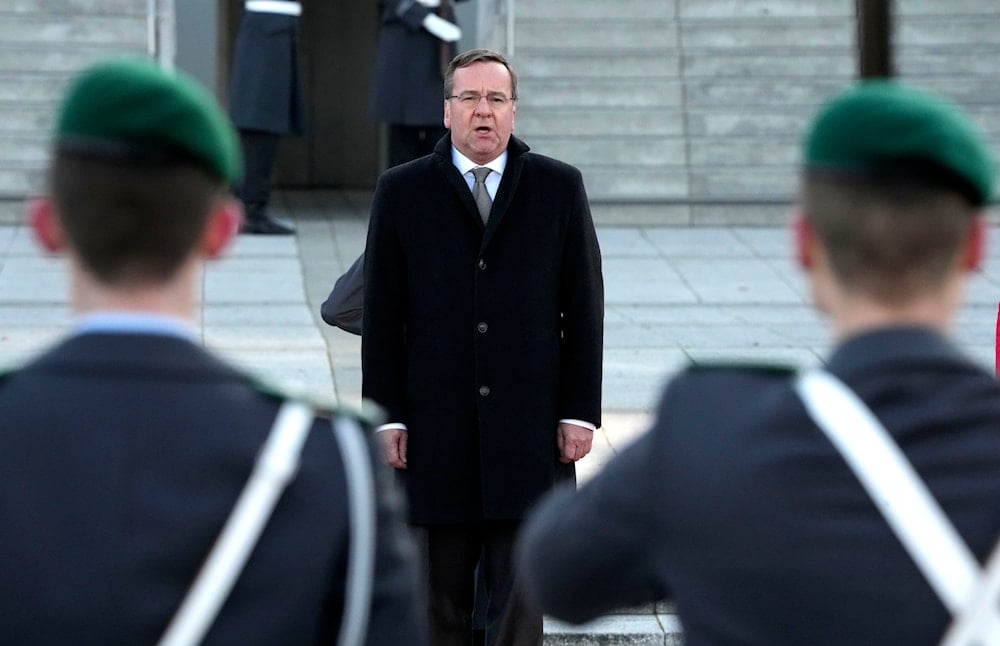Germany could reintroduce military draft: Defense minister
Germany’s Defense Minister Boris Pistorius warns conscription may return if voluntary army enlistment falls short.
-

German Defense Minister Boris Pistorius attends a military welcome ceremony at the Defense Ministry in Berlin, Germany, on January 19, 2023. (AP Photo/Michael Sohn)
Germany may be forced to revive conscription if not enough people voluntarily join the army, Defense Minister Boris Pistorius said on Thursday.
In 2011, Berlin abolished conscription but has recently considered bringing it back, citing perceived threats from Russia.
According to broadcaster N-tv, the Social Democrats and Chancellor Friedrich Merz’s Christian Democrats agreed in their coalition deal to introduce the so-called “Swedish model,” which combines selective mandatory and voluntary service.
"We have agreed that we will initially rely on voluntarism – a service that is initially voluntary and intended to encourage young people to serve their country," Pistorius said in an address to the Bundestag on Wednesday.
He added, "And I say this quite deliberately and honestly: the emphasis is also on ‘initially,’ in case we cannot recruit enough volunteers."
"In the medium and long term, we will strengthen personnel levels to ensure that the Bundeswehr is sustainably positioned for both homeland security and alliance defense," the minister said.
Military service increased by more than 20%
Applications for military service increased by more than 20% in the first quarter of 2025, while Germany plans to raise the number of active soldiers from 180,000 to over 200,000 by 2031.
Enlistment had previously dropped by 7% in 2023, as the Bundeswehr struggled to attract younger recruits, while some politicians described recruitment goals as unrealistic.
Although Germany has supplied Ukraine with heavy weapons, including Leopard 2 tanks, Berlin denies direct involvement in the conflict with Russia. Germany’s top general, Carsten Breuer, told Deutsche Welle in March that the country is living in a "grey zone" between full-scale war and complete peace.
During a visit to Lithuania in January, Pistorius claimed that Russia could prepare its army for a “theoretical attack” on NATO in 2029 or 2030.
However, Moscow has denied any plans to attack NATO member states and accused Berlin of dangerous escalation after Merz voiced support for supplying Kiev with Taurus long-range cruise missiles. Russia argued that the shipment of such sophisticated weapons would make Germany a de facto direct participant in the war.
One in four new recruits in German army drop out
This comes after a Financial Times (FT) report in March revealed that one in four new recruits to the German armed forces are dropping out within six months, according to the country’s military oversight body, which has raised concerns that personnel shortages are pushing the military "to breaking point."
Eva Högl, the German parliament's commissioner for the armed forces, highlighted that while recruitment efforts have had some success, poor retention rates have left the military far from reaching its target of 203,000 soldiers by 2031.
Instead, the total force size has slightly declined to just over 181,000, even as Germany pledges to enhance Europe’s defense amid the potential withdrawal of US support from the continent.
"The Bundeswehr is shrinking and getting older," Högl stated as she presented the annual report on the military's state, noting the average age of soldiers has risen to 34 years, up from 33.1 years in 2021, and stressing that "This development must be stopped and reversed as a matter of urgency."
She explained how "the troops are challenged, but they are also very overburdened. I’ll go as far as to say they’re at breaking point. When we look at where our Bundeswehr is needed, for national defence, NATO alliance defence, and international crisis management, it is a lot. And it really is at the limit."

 4 Min Read
4 Min Read








